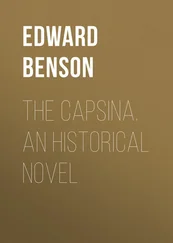Edward Benson - The Angel of Pain
Здесь есть возможность читать онлайн «Edward Benson - The Angel of Pain» — ознакомительный отрывок электронной книги совершенно бесплатно, а после прочтения отрывка купить полную версию. В некоторых случаях можно слушать аудио, скачать через торрент в формате fb2 и присутствует краткое содержание. Жанр: foreign_prose, на английском языке. Описание произведения, (предисловие) а так же отзывы посетителей доступны на портале библиотеки ЛибКат.
- Название:The Angel of Pain
- Автор:
- Жанр:
- Год:неизвестен
- ISBN:нет данных
- Рейтинг книги:5 / 5. Голосов: 1
-
Избранное:Добавить в избранное
- Отзывы:
-
Ваша оценка:
- 100
- 1
- 2
- 3
- 4
- 5
The Angel of Pain: краткое содержание, описание и аннотация
Предлагаем к чтению аннотацию, описание, краткое содержание или предисловие (зависит от того, что написал сам автор книги «The Angel of Pain»). Если вы не нашли необходимую информацию о книге — напишите в комментариях, мы постараемся отыскать её.
The Angel of Pain — читать онлайн ознакомительный отрывок
Ниже представлен текст книги, разбитый по страницам. Система сохранения места последней прочитанной страницы, позволяет с удобством читать онлайн бесплатно книгу «The Angel of Pain», без необходимости каждый раз заново искать на чём Вы остановились. Поставьте закладку, и сможете в любой момент перейти на страницу, на которой закончили чтение.
Интервал:
Закладка:
Philip’s habit of neatness and instinct of gardening led him to stop a moment and nip off a couple of ill-localised buds from a rose. In effect the two others got a little further ahead of them. This may or may not have been intentional.
“All my information is at her service,” he said – “particularly on the subject of roses, about which I know more than South African mines.”
“And care more!” suggested Madge.
“Infinitely more. Are they not clearly more attractive?”
Madge looked at him curiously.
“I believe you really think so,” she said. “And that is so odd. Doesn’t the scheming, the calculation, the foresight required in financial things interest you enormously?”
“Certainly; but I scheme just as much over the roses. Whether this one is to have – well, a whisky-and-soda, or whether it is rheumatic and wants a lowering treatment; that is just as interesting in itself as whether South Africans want lowering or screwing up.”
“You mean you can do that? You can send things up or down? You can say to us, to mother: ‘You shall be poorer to-morrow or richer’?”
Philip laughed.
“I suppose so, to some extent. Pray don’t let us talk about it. It sounds rather brutal, and I am afraid it is brutalising. Yet, after all, a landlord may put up the rent of his houses.”
Madge Ellington walked on for a few paces without replying.
“How odd of you,” she said at length, “not to feel the fascination of power. I don’t mean to say that one would necessarily want to use it, but it must be so divine to know it is there. Well, if you wish, I won’t talk about it.”
Philip turned to her, his brown thin face looking suddenly eager.
“Ah, I would sooner hear you talk about what you please than about what I please,” he said.
She laughed.
“Can’t I manage to combine the two?” she said. “The river, for instance, I think we both love that. Will you promise to let me live on the river while I am here?”
“I warn you that you will have a good deal of my company, then,” said he.
She laughed again.
“But as you are my host I can’t decently object,” she said. “Oh, tell me, Mr. Home, what is Mr. Dundas like? You are a great friend of his, are you not? He was at tea, and asked a series of the silliest riddles, which somehow made me giggle. Giggle hopelessly, do you understand; they were so stupid. And he is the Mr. Dundas, who paints everybody as if they were so much more interesting than they are?”
“Yes, evidently the same,” said Philip. “And what you say is quite true. Yet, again, as you say, his conversation is futile beyond words.”
Madge walked on again in silence a little.
“I think that combination is rather charming,” she said. “People don’t laugh enough, and certainly he makes one laugh. I wish I laughed more, for instance.”
“And has Merivale come?” asked Philip.
“Yes; he was at tea, too. What does he do?”
“He doesn’t do anything. He just thinks.”
“Good heavens! how frightfully fatiguing. All the time, do you mean?”
“Yes, all the time. Have you never met him before? Yet, how should you? He lives in the New Forest, and communes with birds and animals. People think he is mad, but he is the sanest person I know.”
“Why?” asked she.
“Because he has had the wit to find out what he likes, and to do it all the time.”
“And what is that?” asked the girl.
“He sits by a stream and looks at the water. Then he lies on his back and looks at the sky. Then he whistles, chuckles, what you please to call it, and the thrushes come scudding out of the bushes and chuckle back at him.”
“Is that not rather uncanny?” asked Madge.
“Most uncanny. Some day, as I tell him, he will see Pan. And I shall then have to attend a funeral.”
The girl’s eyebrows wrinkled into a frown.
“Pan?” she said.
“Yes; he is the God of ‘Go as you please!’ And his temple is a lunatic asylum. But don’t be alarmed. The Hermit won’t go into a lunatic asylum yet awhile.”
“The Hermit?”
“Yes, the Hermit is Merivale. Because he lives quite alone in the New Forest. He never reads, he hardly ever sees anybody, he never does anything. He used to write at one time.”
Madge shivered slightly.
“How intensely uncomfortable!” she said. “I think I shall like Mr. Dundas best.”
“You are sure to like him.”
“Because everybody does? That is the worst of reasons. I always distrust very popular people.”
“The judgment of the world is usually wrong, you mean. But occasionally one stumbles on an exception.”
The four had turned back towards the house, and as Philip spoke, he and his companion gained the top step of the gravelled square bordered by flower-beds, where he had sat two hours ago with his mother. The shadow of the house had swung over it, and in the gathering dusk the flower-beds glowed with a dim subaqueous radiance. Philip’s mother and Lady Ellington had already passed into the open French window of the drawing-room, but on the stout balustrade of the terrace there sat a young man. One long slim leg rested on the gravel, the other was crooked round the lead vase at the head of the steps. His face, extraordinarily boyish, was clean-shaven, or rather so boyish was it, that it looked as if it was still untouched by razor. He held a cigarette in one hand, and the other, long-fingered and white as a woman’s, grasped his knee.
“Oh, Philip!” he cried; “how are you? Oddly enough, I am quite well. I always was, like Sydney Smith and his great coat. Isn’t there time for a game of croquet before dinner? Let’s all be late, and so we shall all be punctual; it is only a question of degree. Miss Ellington, do come and play. Why did the barmaid champagne, and – oh, I asked you that. Stout, porter is rather good though. I do believe you know it, Philip.”
SECOND
TOM MERIVALE did not, as Mrs. Home had feared he might, appear without clothes at dinner, nor did he make clamorous demands for cabbage. It is true that he ate no meat of any kind, but he was not of the preaching sort of vegetarians, and did not call attention to his abstinence. Instead, he and Evelyn Dundas between them managed to turn the meal into a ridiculous piece of gaiety by sheer exuberance of animal spirits, and even Lady Ellington forgot to examine the dishes with her usual magisterial air, and really ate and drank without criticising.
There was an extraordinary superficial resemblance in certain ways between the two men. Both, at any rate, were glorious examples of the happiness that springs from health, a happiness which is as inimitable as it is contagious. By health, it must be premised, is not meant the mere absence of definite ailments, but that perfect poise between an active mind and an exuberant body which is so rare.
It was on this very subject that Merivale was speaking now.
“Ah, no, Lady Ellington,” he was saying, “to be able to get through the day’s work, day after day and year after year, is not health. Perfect health implies practically perfect happiness.”
“But how if you have a definite cause of worry?” she said.
“You can’t worry when you are well. One knows, for example, that if one is definitely unwell, the same cause produces greater worry and discomfort than if one is not. And my theory is, that if one is absolutely well, if your mind and soul, that is to say, as well as your body, are all in accord with each other and with their environment, worry is impossible.”
Lady Ellington, to do her justice, always listened to that were really new to her. She always assumed, by the way, that they were not.
“My theory exactly,” she said. “I could scarcely have lived through these last years unless I had made up my mind never to let any anxiety take hold of me.”
Читать дальшеИнтервал:
Закладка:
Похожие книги на «The Angel of Pain»
Представляем Вашему вниманию похожие книги на «The Angel of Pain» списком для выбора. Мы отобрали схожую по названию и смыслу литературу в надежде предоставить читателям больше вариантов отыскать новые, интересные, ещё непрочитанные произведения.
Обсуждение, отзывы о книге «The Angel of Pain» и просто собственные мнения читателей. Оставьте ваши комментарии, напишите, что Вы думаете о произведении, его смысле или главных героях. Укажите что конкретно понравилось, а что нет, и почему Вы так считаете.











